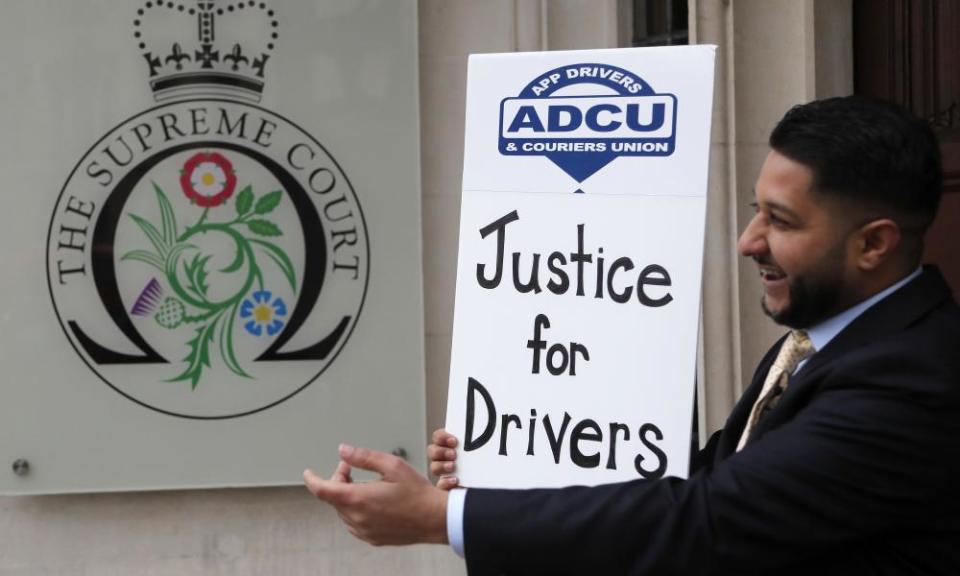The Guardian view on the Uber drivers ruling: a challenge to government

It is difficult to think of ways in which Friday’s supreme court ruling on the employment status of Uber drivers could have been more emphatic or conclusive than it was. The six justices agreed unanimously to uphold a groundbreaking employment tribunal finding made against the company in 2016. Uber drivers, the court confirmed, are not self-employed – as Uber argued in a succession of appeals – but should be treated as workers, with rights to be paid at least the national minimum wage, to holiday pay and other benefits.
Uber’s claim that it was simply an intermediary between its drivers and passengers was comprehensively dismissed. Every aspect of the company’s attempt to disclaim employment responsibilities was forensically unpicked. The court said it was Uber, not the drivers, who set the fares, which could not be exceeded. Contract terms were set by Uber too, with drivers allowed no say. Once they logged on to the app, it was Uber, not the drivers, that set the rules about accepting requests for rides and monitoring customer satisfaction. The net effect, said the court in a chilling phrase, is that drivers “are in a position of subordination and dependency in relation to Uber”.
The consequences of this judgment will be substantial, and not just for the drivers and Uber. Even when it is seen in the narrowest perspective, the decision means that the case goes back to the employment tribunal, where compensation levels will now be set. One legal firm suggests tens of thousands of Uber drivers are now set to be awarded an average of £12,000 each. The impact on Uber’s balance sheet and business model, both here and across the world, may be long term. So it should be.
But the impact goes further. Uber is a huge player in deregulated urban transport markets in multiple countries. The Uber case is one of a number currently before the UK courts, involving not just minicab firms like Addison Lee, but some of the many delivery groups that have proliferated on our streets during the pandemic. Widely and often rightly praised as essential during the lockdowns, these delivery workers are surfing an economically precarious wave. All these firms now face the need to adapt to the implications of the Uber ruling too.
More generally, the court ruling also throws down a challenge to governments about the wider workings of the on-call gig economy and zero-hours contract jobs markets. This is now a truly pressing issue for Britain, especially in the disruptive wake of Brexit and with many Covid-related job protections likely to be lifted during this year. In 2019, Boris Johnson pledged to introduce an employment bill that would protect and enhance workers’ rights as the UK left the EU, “making Britain the best place in the world to work”. Yet nothing has happened, and not just because of the pandemic.
Instead, the Johnson government’s attitude to working conditions and employment rights has become increasingly opaque and uncertain. After stepping down as its director of labour market enforcement last month, Matthew Taylor observed that ministers’ initial enthusiasm for fair controls “has waned, and waned, and waned”. In January, a government review of post-Brexit employment law was first agreed, then confirmed, and then apparently scrapped. These developments inevitably sow suspicion about the true intentions of a Conservative party that still instinctively sees workers’ rights as a barrier to business. The Uber ruling highlights the chasm between the deregulated and the regulated routes forward. It is at once a reminder that Britain stands at a society-defining crossroads, and a signpost to the choice that the Johnson government must make.

 Yahoo Finance
Yahoo Finance 